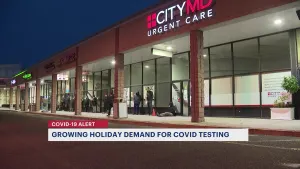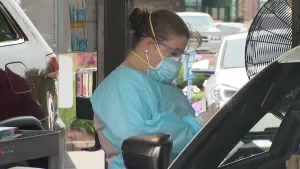More Stories
Scammers are trying to take advantage of health and financial worries caused by the COVID-19 pandemic.
According to PSEG Long Island, they may try to reach you in different ways — anything from phone calls and emails to fake charities and unauthorized vaccines.
Follow these nine tips to protect yourself, your wallet and others from scammers:
1. Don't click on links from unknown senders
If anything seems off about an email, don't click on any links and delete it.
2. Ignore robocalls
If you receive a phone call from an unknown or suspicious number, ignore it or hang up immediately. Don't press any numbers or offer any personal information to the caller.
According to PSEG Long Island, they may try to reach you in different ways — anything from phone calls and emails to fake charities and unauthorized vaccines.
Follow these nine tips to protect yourself, your wallet and others from scammers:
1. Don't click on links from unknown senders
If anything seems off about an email, don't click on any links and delete it.
2. Ignore robocalls
If you receive a phone call from an unknown or suspicious number, ignore it or hang up immediately. Don't press any numbers or offer any personal information to the caller.
3. Trust doctors over peddlers
Treatments for COVID-19 require intense scrutiny. Information about safe and effective medical advancements will come from professionals, not salespeople.
Treatments for COVID-19 require intense scrutiny. Information about safe and effective medical advancements will come from professionals, not salespeople.
4. Disregard offers for home testing kits and vaccinations
The Food and Drug Administration (FDA) hasn't authorized any home testing kits or vaccinations. Any products advertised online for these products aren't proven to treat or prevent the virus.
5. Don't 'sign up' to receive a relief check
The federal government has the information it needs to send you your relief check if you filed taxes for 2018 and/or 2019. Anyone asking for your personal information to help you "sign up" to receive your check is a scammer, according to the Federal Trade Commission (FTC). Only use irs.gov/coronavirus to submit information to the IRS – and never in response to a call, text, or email.
6. Don’t pay for government benefits
Stimulus checks, unemployment payments and Medicare benefits never require you to pay upfront to apply for, or receive them.
7. Research online sellers before making a purchase
Some scammers are posing as online sellers with access to in-demand items, such as cleaning products and medical supplies. If you need any of these products, use a trusted delivery service or order directly from a store.
The Food and Drug Administration (FDA) hasn't authorized any home testing kits or vaccinations. Any products advertised online for these products aren't proven to treat or prevent the virus.
5. Don't 'sign up' to receive a relief check
The federal government has the information it needs to send you your relief check if you filed taxes for 2018 and/or 2019. Anyone asking for your personal information to help you "sign up" to receive your check is a scammer, according to the Federal Trade Commission (FTC). Only use irs.gov/coronavirus to submit information to the IRS – and never in response to a call, text, or email.
6. Don’t pay for government benefits
Stimulus checks, unemployment payments and Medicare benefits never require you to pay upfront to apply for, or receive them.
7. Research online sellers before making a purchase
Some scammers are posing as online sellers with access to in-demand items, such as cleaning products and medical supplies. If you need any of these products, use a trusted delivery service or order directly from a store.
8. Don't rush into making a donation
Before donating to a charity or supporting a cause on a crowdfunding site, research the organizer and the cause. The FTC offers more tips to avoid charity scams.
These organizations offer reports and ratings about how charitable organizations spend donations and how they conduct business:
BBB Wise Giving Alliance
Charity Navigator
CharityWatch
GuideStar
9. Be on the lookout for misinformation
Keep yourself and others safe by not sharing information that isn't backed by research or hasn't been verified by qualified experts. Refer to websites like the Internal Revenue Service (IRS), Centers for Disease Control and Prevention (CDC) and World Health Organization (WHO) for the most up-to-date information about stimulus checks and medical developments.
Need help identifying scams?
Google unveiled a new website to teach users how to spot and avoid scams. Scamspotter.org contains information about hoaxes and their standard patterns, as well as how to identify things like fake stimulus checks or even fake vaccine offers.
BBB Wise Giving Alliance
Charity Navigator
CharityWatch
GuideStar
9. Be on the lookout for misinformation
Keep yourself and others safe by not sharing information that isn't backed by research or hasn't been verified by qualified experts. Refer to websites like the Internal Revenue Service (IRS), Centers for Disease Control and Prevention (CDC) and World Health Organization (WHO) for the most up-to-date information about stimulus checks and medical developments.
Need help identifying scams?
Google unveiled a new website to teach users how to spot and avoid scams. Scamspotter.org contains information about hoaxes and their standard patterns, as well as how to identify things like fake stimulus checks or even fake vaccine offers.
Scammers are expected to steal over $2 billion in 2020. According to Google, we can thwart their efforts with the three golden rules:
Slow it down - Scammers often create a sense of urgency so that they can bypass your better instincts.
Spot check - Do your research to double check the details you're getting.
Stop! Don't send - No reputable person or agency will ever demand payment on the spot. If you think the payment feels fishy, it probably is.
Slow it down - Scammers often create a sense of urgency so that they can bypass your better instincts.
Spot check - Do your research to double check the details you're getting.
Stop! Don't send - No reputable person or agency will ever demand payment on the spot. If you think the payment feels fishy, it probably is.
More from News 12
1:58

Lines stretch out at Wall Township COVID-19 testing site ahead of Christmas holiday
0:33

Teaneck COVID-19 testing drive-thru site reopens as cases surge

Your Coronavirus 2020 Photos

10 online learning tools for students to use at home
11:21:40

6 tips for home schooling children and remote learning
